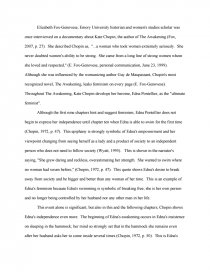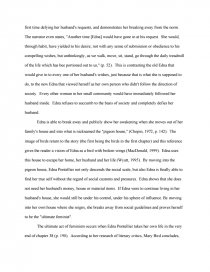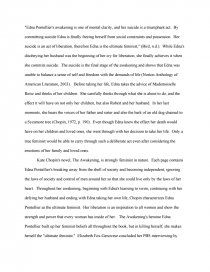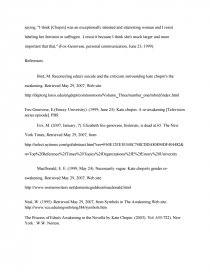Edna Pontellier in the Awakening
Essay by review • May 25, 2011 • Research Paper • 1,212 Words (5 Pages) • 1,548 Views
Elizabeth Fox-Genovese, Emory University historian and women's studies scholar was once interviewed on a documentary about Kate Chopin, the author of The Awakening (Fox, 2007, p. 27). She described Chopin as, "...a woman who took women extremely seriously. She never doubted women's ability to be strong. She came from a long line of strong women whom she loved and respected," (E. Fox-Genovese, personal communication, June 23, 1999). Although she was influenced by the womanizing author Guy de Maupassant, Chopin's most recognized novel, The Awakening, leaks feminism on every page (E. Fox-Genovese). Throughout The Awakening, Kate Chopin develops her heroine, Edna Pontellier, as the "ultimate feminist".
Although the first nine chapters hint and suggest feminism, Edna Pontellier does not begin to express her independence until chapter ten when Edna is able to swim for the first time (Chopin, 1972, p. 47). This epiphany is strongly symbolic of Edna's empowerment and her viewpoint changing from seeing herself as a lady and a product of society to an independent person who does not need to follow society (Wyatt, 1995). This is shown in the narrator's saying, "She grew daring and reckless, overestimating her strength. She wanted to swim where no woman had swum before," (Chopin, 1972, p. 47). This quote shows Edna's desire to break away from society and be bigger and better than any woman of her time. This is an example of Edna's feminism because Edna's swimming is symbolic of breaking free; she is her own person and no longer being controlled by her husband nor any other man in her life.
This event alone is significant, but also in this and the following chapters, Chopin shows Edna's independence even more. The beginning of Edna's awakening occurs in Edna's insistence on sleeping in the hammock; her mind so strongly set that in the hammock she remains even after her husband asks her to come inside several times (Chopin, 1972, p. 50). This is Edna's first time defying her husband's requests, and demonstrates her breaking away from the norm. The narrator even states, "Another time [Edna] would have gone in at his request. She would, through habit, have yielded to his desire; not with any sense of submission or obedience to his compelling wishes, but unthinkingly, as we walk, move, sit, stand, go through the daily treadmill of the life which has bee portioned out to us," (p. 52). This is contrasting the old Edna that would give in to every one of her husband's wishes, just because that is what she is supposed to do, to the new Edna that viewed herself as her own person who didn't follow the direction of society. Every other woman in her small community would have immediately followed her husband inside. Edna refuses to succumb to the basis of society and completely defies her husband.
Edna is able to break away and publicly show her awakening when she moves out of her family's house and into what is nicknamed the "pigeon house," (Chopin, 1972, p. 142). The image of birds return to the story (the first being the birds in the first chapter) and this reference gives the reader a vision of Edna as a bird with broken wings (MacDonald, 1999). Edna uses this house to escape her home, her husband and her life (Wyatt, 1995). By moving into the pigeon house, Edna Pontellier not only descends the social scale, but also Edna is finally able to find her true self without the regard of social customs and pressures. Edna shows that she does not need her husband's money, house or material items. If Edna were to continue living in her husband's house, she would still be under his control, under his sphere of influence. By moving into her own house where she reigns, she breaks away from social guidelines and proves herself to be the "ultimate feminist".
The ultimate act of feminism occurs when Edna Pontellier takes her own life in the very end of chapter 38 (p. 190). According to her research of literary critics, Mary Bird concludes, "Edna Pontellier's awakening is one of mental clarity, and her suicide is a triumphant act. By committing suicide Edna is finally freeing herself from social constraints and possession. Her suicide is an act of liberation, therefore Edna is the ultimate feminist," (Bird, n.d.). While Edna's disobeying her husband was the beginning of her cry for liberation, she finally achieves it when she commits suicide. The suicide is the final stage of the awakening and shows that Edna was unable to balance a sense of self and freedom with the demands of life (Norton Anthology of American Literature,
...
...



